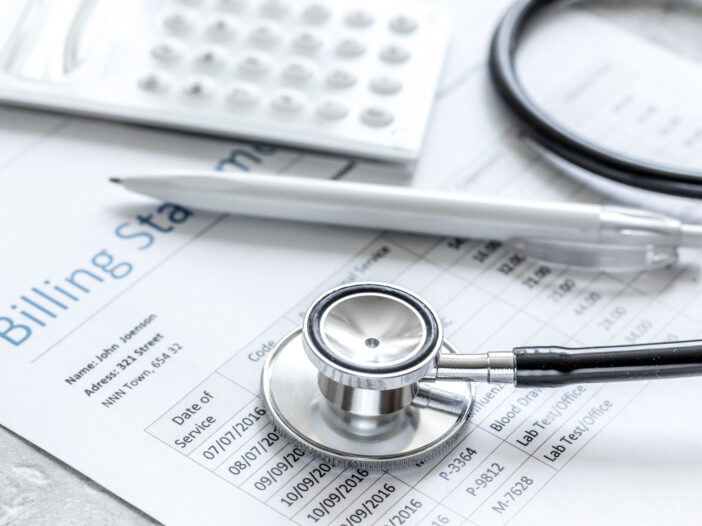
FAQ
Answers to Your Billing Questions
What is a deductible? Coinsurance? Co-payment? Insurance plans generally have deductibles, co-payments, and/or coinsurances that are the responsibility of the subscriber, patient, and/or guarantor.
Deductible: A “deductible” is an annual expense that you must pay before your insurance benefit can begin. This amount can vary based on a place of service (i.e. provider’s office vs. hospital). Supplemental insurance plans may cover this cost; however, it is based on your selected insurance benefit package.
Coinsurance: A “Coinsurance” is the percentage of the total bill that is the patient and/or guarantor’s responsibility to pay. This amount can vary based on place of service (i.e. provider’s office vs. hospital). Supplemental insurance plans may cover this cost; however, it is based on your selected insurance benefit package.
Co-payment: A “Co-payment” is a set amount paid at each visit, based on your selected insurance benefit package. This is usually not applied towards your deductible.
For example: On a $1000 bill, your deductible might be $200, so you would have to pay the first $200. This leaves a balance of $800. Of that $800, your co-insurance might be 20%, meaning that you will be responsible to pay $160. Your insurance company should pay $640. Once the insurance company has made payment, you should receive an explanation of benefits from your insurance and will receive a statement from the hospital indicating the remaining balance.
Questions related to an insurance company payment and/or denial should be made directly to your insurance company or benefits office.
Who is responsible for paying my bill? The hospital will bill your insurance directly, unless specified otherwise. You are ultimately responsible to make certain that your bill is paid, either by the insurance and/or responsible party. If a balance remains after your insurance has issued a payment or a denial, payment is due immediately upon receipt of your statement from the hospital.
How can I pay my bill? There are several payment options:
- Secure online bill payment at Pay Your Bill Online
- To pay with credit or debit by telephone contact us at:
- Lewiston Area: 1-833-486-2738
- Bridgton Area: 1-833-486-2738
- Rumford Area: In state toll-free number 1-833-486-2738
- We accept Visa, MasterCard, Discover and American Express
- Cashier’s check, personal check or credit card information can be mailed to the following address. Indicate account number on the lower left-hand corner of the check:
- Central Maine Healthcare
PO Box 4100
Lewiston, Maine 04243-4100
- Central Maine Healthcare
- Visit the following locations to make a payment in person:
- CMH Patient Financial Services
29 Lowell Street, 1st Level
Lewiston, Maine 04240 - Bridgton Hospital
10 Hospital Drive
Bridgton, Me 04009 - Rumford Hospital
420 Franklin Street
Rumford, Maine 04276
- CMH Patient Financial Services
What other bills will I receive? In addition to your bill from the hospital or its providers, you may receive bills from private providers who took care of you. These providers who may or may not participate in your health care may include:
- Primary Care provider
- Surgeon
- Anesthesiologist
- Radiologist
- Pathologist
- Other specialist
Did you bill my correct insurance? Insurance-related questions may be directed to the Patient Financial Services department by calling 1-833-486-2738 or one of the telephone numbers listed above.
What is “pending” with my insurance? You may have received a letter or questionnaire from your insurance company requesting additional information. If you do not respond to this request, the bill may ultimately become your responsibility. Questions about your account may be directed to the Patient Financial Services department at 1-833-486-2738 or one of the telephone numbers listed above.
What do I owe? You should receive an account statement in the mail. Your statement will reflect any unpaid balances on your accounts. Questions related to account statement balance can be directed to the Patient Financial Services department at 1-833-486-2738 or one of the numbers listed above.
Did you receive my payment? There may be times where a statement is generated prior to your payment being posted. Any new payments on your account should be reflected on your next account statement. Questions about your account may be directed to the Patient Financial Services department by calling 1-833-486-2738.
What if I didn’t have my insurance information at the time of service? You should contact the Patient Financial Services department immediately by calling 1-833-486-2738 or one of the telephone numbers listed above to ensure proper billing requirements are met, and to prevent pre-certification and timely filing issues with your insurance plan.
What are a referral and a pre-certification, and who is responsible for taking care of these?
Referral: Many insurance plans require a referral from your Primary Care provider to a specialist and/or the hospital for specific services. Without a referral from your Primary Care provider, services are often denied for payment and the bill may ultimately be your responsibility.
Pre-certification: Many insurance plans require prior approval for services by patients, their Primary Care provider, or ordering provider before services can be covered. Without pre-certification from the ordering provider, services are often denied for payment and the bill may ultimately be your responsibility.
Please review your health plan booklet or call your insurance company to clarify your benefits, referral, and pre-certification requirements prior to receiving any services.
Why didn’t my insurance pay? You should have received an Explanation of Medical Benefits (EOMB) or Explanation of Payment (EOP) from your insurance company, showing how they considered your claim. This EOMB/EOP should have a contact telephone number or website where you can reach your insurance company for questions. Please contact your insurance company or benefits office with questions about denied claims.
I was injured at work – why am I getting a bill? After notifying your employer of a work-related injury, your employer should have filed a ‘Notice of Injury’ with the company’s worker’s compensation carrier. If they did not, the claim may be denied and become your responsibility.
Facility Charges/Fees
Notice-to-Patients-Regarding-Facility-Fees-Charged-by-Healthcare-Entities-CMMC
Notice-to-Patients-Regarding-Facility-Fees-Charged-by-Healthcare-Entities-BH
Notice-to-Patients-Regarding-Facility-Fees-Charged-by-Healthcare-Entities-RH
Notice-to-Patients-Regarding-Facility-Fees-Charged-by-Healthcare-Entities-CMCA
